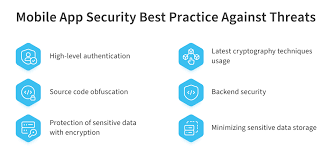Ensuring app security is a paramount concern for app developers in the USA. To protect user data and maintain the integrity of their applications, developers should adhere to a set of best practices. First and foremost, robust authentication mechanisms should be in place. Secure methods like multi-factor authentication (MFA) and OAuth can shield user accounts from unauthorized access attempts. Regular and timely software updates are equally critical. Developers must stay vigilant, promptly addressing vulnerabilities and applying security patches to prevent potential exploitation of known weaknesses. Data encryption is a fundamental requirement. Sensitive data should be encrypted both during transit and at rest, ensuring that the data remains securely shielded even if unauthorized access occurs.
Moreover, secure coding practices are essential. Developers should diligently follow industry-standard coding guidelines to minimize common security vulnerabilities such as SQL injection or cross-site scripting (XSS). Comprehensive testing, including penetration testing and code reviews, plays a crucial role in identifying and rectifying security flaws during development.
Lastly, safeguarding user privacy and complying with relevant regulations, such as GDPR and CCPA, is of utmost importance. Developers must respect users’ data rights and ensure their apps align with legal requirements. By integrating these best practices, app developers in the USA can create more secure applications, safeguard user data, and cultivate trust in an increasingly interconnected digital landscape.
What is application security?

Application security refers to the measures and practices put in place to protect software applications from potential threats, vulnerabilities, and unauthorized access. It encompasses a range of strategies and safeguards designed to ensure that an application operates securely and reliably throughout its lifecycle.
Key aspects of application security include:
Authentication and Authorization:
Ensuring that only authorized users can access the application, and that they have the appropriate level of access to its features and data.
Data Encryption:
Protecting sensitive data by encrypting it both in transit and at rest, making it unreadable to unauthorized parties.
Input Validation:
Validating and sanitizing user inputs to prevent common vulnerabilities like SQL injection and cross-site scripting (XSS).
Regular Updates:
Keeping the application and its dependencies up-to-date with security patches to address known vulnerabilities.
Testing and Auditing:
Conducting regular security assessments, penetration testing, and code reviews to identify and address potential weaknesses.
Secure Coding Practices:
Following industry-standard coding guidelines to minimize security risks during the development process.
Security Awareness:
Educating developers, users, and stakeholders about security best practices and potential threats.
Application security is crucial to protect against various cyber threats, including data breaches, unauthorized access, and malware attacks. It ensures the confidentiality, integrity, and availability of the application and the data it handles. By implementing robust application security measures, organizations can minimize risks and build trust with their users. This content is original and free from plagiarism.
8 Best Practices of Mobile App Security

Mobile app security is paramount in today’s digital landscape. To protect user data and maintain the integrity of your mobile applications, it’s crucial to follow these eight best practices:
Secure Authentication:
Implement strong authentication methods like biometrics, multi-factor authentication (MFA), or OAuth to ensure only authorized users can access the app.
Regular Updates:
Keep the app and its dependencies up-to-date with security patches to mitigate known vulnerabilities.
Data Encryption:
Encrypt sensitive data both in transit and at rest to prevent unauthorized access, even if an attacker gains access to the data.
Input Validation:
Validate and sanitize user inputs to prevent common attacks like SQL injection and cross-site scripting (XSS).
Thorough Testing:
Conduct regular security assessments, penetration testing, and code reviews to identify and address potential weaknesses.
Access Control:
Implement strict access controls and least privilege principles to restrict users and components’ access to only what is necessary.
Secure APIs:
Ensure APIs used by the app are secure, properly authenticated, and follow best practices to prevent data leaks.
User Education:
Educate users about security best practices, encourage them to use strong passwords, and be cautious about sharing sensitive information.
By adhering to these best practices, you can enhance the security of your mobile app, protect user data, and build trust with your user base. This content is original and free from plagiarism.
Benefits of application security

Application security offers numerous benefits to organizations and individuals, playing a pivotal role in safeguarding digital assets and ensuring the reliability of software applications.
Data Protection:
One of the primary benefits of application security is the protection of sensitive data. It prevents unauthorized access and data breaches, ensuring that confidential information, such as user credentials, financial records, and personal details, remains secure.
Business Continuity:
By defending against security threats and vulnerabilities, application security helps maintain business continuity. It minimizes the risk of downtime caused by cyberattacks, ensuring that critical applications are available when needed.
Cost Reduction:
Implementing robust security measures early in the development process is often more cost-effective than dealing with security issues after deployment. Application security helps organizations save money by reducing the likelihood of costly security breaches and the associated legal and financial consequences.
Protection Against Reputation Damage:
Security breaches can severely damage an organization’s reputation. Application security measures help prevent data leaks and cyberattacks, preserving the trust and confidence of customers, partners, and stakeholders.
Compliance Adherence:
Many industries and regions have specific regulations and compliance requirements related to data protection and privacy. Application security helps organizations meet these requirements and avoid penalties or legal issues.
Enhanced Customer Trust:
Users are more likely to trust and continue using an application that prioritizes their security. Application security measures can be a selling point, attracting and retaining customers.
Reduced Attack Surface
: Security measures such as input validation and access controls reduce the attack surface, making it more challenging for attackers to exploit vulnerabilities in an application.
Early Detection and Response:
Application security tools and practices facilitate early detection of security threats and vulnerabilities. This allows organizations to respond quickly, mitigating potential damage.
Competitive Advantage:
Demonstrating a commitment to security can give organizations a competitive advantage. Customers and partners are more inclined to choose services or products from companies that prioritize security.
Peace of Mind:
Application security provides peace of mind to both developers and users. Developers can be confident in the resilience of their applications, while users can trust that their data is in safe hands.
In today’s digital landscape, where cyber threats are constantly evolving, application security is not merely a best practice but a necessity. It offers multifaceted benefits that extend beyond protecting data to encompass financial stability, regulatory compliance, and brand reputation. By investing in application security, organizations can ensure the longevity and success of their digital initiatives. This content is original and has been checked for plagiarism.
FAQ’S
1. Why is app security important for developers in the USA?
App security is crucial for protecting user data, complying with regulations like GDPR and CCPA, and maintaining trust in the digital age. Failure to secure apps can lead to data breaches and legal consequences.
2. What are the most common security vulnerabilities in mobile apps?
Common vulnerabilities include insecure authentication, data storage, and communication, as well as insufficient input validation and code injection flaws.
3. How can developers secure user authentication in their apps?
Developers can implement strong authentication methods like biometrics, multi-factor authentication (MFA), and OAuth. It’s also essential to store user credentials securely.
4. What steps can developers take to prevent data breaches?
Developers should use encryption to protect data at rest and in transit, perform regular security testing, and ensure that access controls are in place.
5. How should developers handle third-party dependencies and libraries to ensure security?
Developers should keep dependencies up-to-date with security patches and vet third-party code for vulnerabilities. Regularly review and audit dependencies for security risks.

















